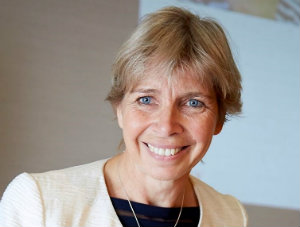22 September 2016
Professor Sarah Cleaveland OBE, Chiron Award 2016
Professor Sarah Cleaveland OBE was today (22 September) announced as the recipient of the British Veterinary Association's (BVA) prestigious Chiron Award.
The award recognises the distinctive contributions Sarah has made as a true champion for One Health and acknowledges the impacts of her research on human and animal health across disciplinary and geographic boundaries.
Sarah's pivotal contribution to the development of international strategies for global rabies eradication, her extensive work on zoonotic and livestock diseases in developing countries, and her strong personal commitment to focus attention on the needs of marginalised communities in the control of animal diseases were cited as highlights of a unique and truly outstanding veterinary career.
Sarah qualified from the University of Cambridge in 1988 and obtained her PhD from the London School of Hygiene and Tropical Medicine in 1996. After a decade at the Royal (Dick) School of Veterinary Studies, Edinburgh, she moved to Glasgow University in 2008 where she is now Professor of Comparative Epidemiology at the Institute of Biodiversity, Animal Health & Comparative Medicine at the College of Medical, Veterinary & Life Sciences.
Sarah is best known for her work on rabies control, an interest sparked by watching the film ‘Old Yeller' when she was younger. She has been a tireless advocate for rabies control, raising awareness about the horrifying burden and scale of the disease across Africa, as well as implementing large-scale rabies control projects around the Serengeti and demonstrating the feasibility and benefits of canine rabies control. This programme has not only prevented hundreds of human and animal deaths, but has also protected wildlife species such as the endangered African wild dog.
Sarah put enormous personal time and energy into spearheading the establishment of what is now known as the Global Alliance for Rabies Control, an organisation that advocates for global canine rabies elimination. It is a tribute to Sarah's work that next week World Rabies Day celebrates its 10-year anniversary, an initiative of the Alliance and an event which, since 2007, has educated millions of people who live at daily risk of exposure to rabies and has resulted in the vaccination of millions of dogs; these efforts have saved lives.
The importance of livestock disease control for sustaining rural livelihoods, reducing poverty and malnutrition in pastoral communities have also been at the forefront of Sarah's work in East Africa, where her efforts have contributed substantially to generating awareness and developing effective approaches to control of diseases such as bovine TB, brucellosis, foot-and-mouth disease and malignant catarrhal fever.
Sarah is currently leading Livestock, Livelihoods and Health, an international One Health research programme in Tanzania which aims to provide the evidence base to inform new strategies for zoonotic disease control and elimination, protecting human and animal health and improving people's livelihoods. Involving multidisciplinary teams of medical, veterinary and social scientists, Sarah is also committed to building and sustaining partnerships with African institutions and researchers as an integral part of the research.
On hearing that she was to receive the Chiron Award, Sarah commented:
"I am honoured and humbled to have been given this award from the BVA. Awards like this are recognition of the contributions not only of one person, but the work of many. I have been privileged to work with many excellent scientists throughout my career and this award recognises their contribution too. We are deeply committed to continuing our efforts towards the global elimination of canine rabies and tackling other zoonotic diseases that affect the health and livelihoods of many of the poorest people in the world.”
Amongst Sarah's other honours are her election as a Fellow of the Royal Society of Edinburgh in 2012; her OBE for services to veterinary epidemiology in 2014; her election to the National Academy of Medicine in 2015; and her election as a Fellow of the Royal Society earlier this year. All bear testament to the far reaching benefits and impacts of her work at the interface of veterinary medicine, conservation biology and human health and recognise Sarah's place amongst the most eminent scientists in both the national and international arena, enhancing the profile of excellence in veterinary science.
Print ready of photographs of Professor Sarah Cleaveland are available to download from www.flickr.com/photos/britishvets/29499279910/in/album-72157658973410802/



